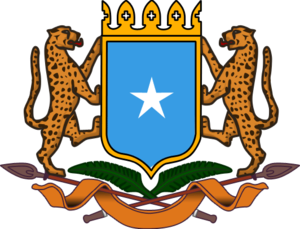 Image via Wikipedia
Image via Wikipedia
Abdullahi Yusuf Ahmed, Sheikh Sharif’s predecessor, set base in 2004 at a warehouse in Baidoa after finding Villa Somalia a risky place to operate from. In Baidoa, President Yusuf was provided with a strong security detail manned by heavily-armed Ethiopian occupation forces. Mockingly, even the forces of the Lion of Judah could not provide President Yusuf the security he looked forward to. On one occasion suicide bombers infiltrated a ceremony presided over by the President leaving behind a bloodbath. On the other hand, Professor Ali Gedi Mohamed, Yusuf’s hand-picked Prime Minister once escaped a similar suicide bombing in Mogadishu though one of his relatives perished in the premeditated blast hatched by Somalia’s foreign fighters. Both President Yusuf and Prime Minister Gedi left the political spectrum disgraced and dejected.
Sheikh Sharif’s administration lacks rigid Foreign and National Security Policy operations for sustaining compromise and stability. Majority of the opposition leaders have been in the same camp with Sheikh Sharif before partying ways. By picking moderation to fundamentalism, Sheikh Sharif suffered the brunt of the opposition for deviating from the initial extreme Islamic concept of Jihad they previously advocated together during their joint struggle against the dreaded Somali warlords and the Ethiopian occupation forces. Thus, to the opposition, Sheikh Sharif is an obstacle to national stability and a proxy figure who is serving un-Islamic foreign forces opposed to the establishment of a collective Islamic state for Somalia and the Horn of Africa.
Determined to frighten the increased AMISOM force destined for Somalia, al-Shabab, the strongest jihadist faction in Somalia recently forged alliance with Hizb-al-islam- a smaller group with a long history of armed resistance. Both groups have been calling residents to join the broader jihad being implemented in the country while at the same time conscripting young Somalis into their fold in the regions they control. In Yemen al-Qaida is sending material and moral support to both groups for the sake of keeping its global insurrection alive. On the other hand, the disappearance of 1,000 Somali police officers trained in Ethiopia and funded by the German government could be an added advantage for the two factions should this new force be received with open hands.
The major cause of defection in the army and police is due to nonpayment of salaries and arrears. Often, government soldiers defect with their weapons and significant intelligence tidbits that boost opposition acumen and fighting power. The current Somali government lacks accountability and no wonder embezzlement is rife and that corruption has grown roots everywhere. Somalia is on the top of the list of the most corrupt states in the world. While Somali leaders travel around the world with empty begging bowls in hand, the disappearance of donor funds earmarked for the welfare of the suffering mass exacerbates the withholding of intended philanthropic gestures by foreign entities.
The prime responsibility of any head of state is to safeguard the security of the state. Unfortunately, for Somalia, the picture is different as both the president, prime minister, and the speaker of parliament have little time sitting in their offices-not because they are overburdened by national policy issues-but because they spend most of their time leaping from one foreign airport to the other. For any nation determined to prosper politically, socially, and economically, it is of paramount importance that a strong security force be in place. The rule of law must be held in high esteem so that businesses may operate without encumbrances.
Of late, the nation’s 550 members of parliament have not resolved a single conceivable legislative draft nor have they unanimously passed any bill as majority are either illiterate or semiliterate, harbor divergent political views or are divided along clan lines. The persistent division visible within the TFG gives the insurgents more clout and unanimity in their endeavors to eliminate any existing government hierarchy and establishment. As long as the leaders of the TFG continue treading blatantly their peripatetic lifestyles and globetrotting attitudes, remorseless pounding of government positions by the opposition will continue unabated.


No comments:
Post a Comment